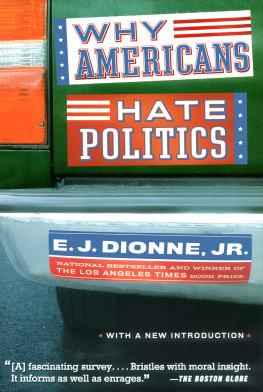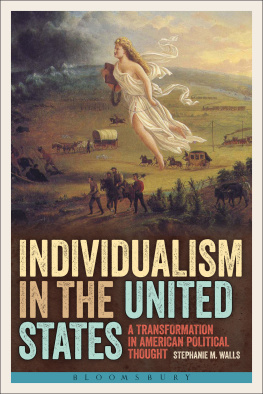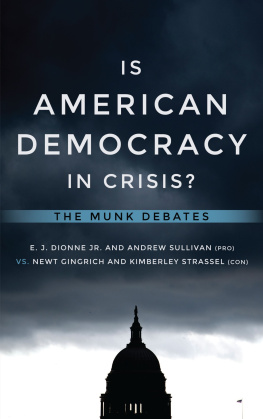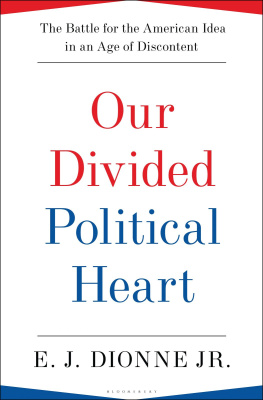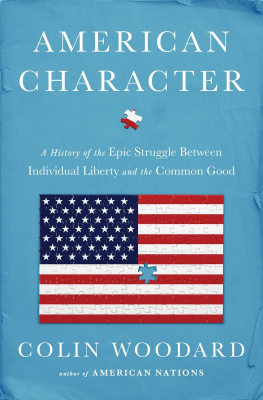E. J. Dionne is the latest in a long line of serious American journalists who are also serious thinkers in their own right. It is therefore not surprising that he has written an extraordinary book at an extraordinary time in our history. Dionne shows us that we cant understand our present unless we understand where we came from. Moving beyond a sound-bite version of our history, he gives us a deeply informed and eminently readable account of our story with all its conflicts, failures, and triumphs. He has written a book for all of us who consider ourselves citizens of the American Republic, a book that speaks not only to where we are at this perilous moment, but of where we need to go. In a word, this book is indispensable.
Robert Bellah, coauthor of Habits of the Heart and author of Religion in Human Evolution
Are Americans rugged individualists? Are we community-loving civic republicans? The answer to both questions, writes E. J. Dionne in his wise new book, is yes. We value individualism but not as an end in itself; we value community but not at the expense of fundamental liberties. And contrary to the Tea Partys noisy revisionism, this is what the Founders believed as well. Twenty years after his classic of political journalism, Why Americans Hate Politics, Dionne has once again excavated our current political dilemmas and shown how we can rise above them.
Jacob S. Hacker, coauthor of Winner-Take-All Politics
E. J. Dionne is the thoughtful conservatives favorite liberal, and the liberal all the rest of us learn from. Our Divided Political Heart is at once a grand arc of American thought from the nations founding, and an up-to-the-minute diagnosis of the weird and sudden turn weve taken in left-right relations. With malice toward none, Dionne sounds the alarm about the new threat to the long consensus thats been key to our stability and our national greatness. A thrilling book, from one of Americas most universally respected minds. You should buy it. Rachel Maddow
E. J. Dionnes compelling exploration of the dual traditions that compose the American ideology is indispensible for anyone who wants to understand how the past both shapes our present conflicts and can help us imagine a better future. Michael Kazin, author of American Dreamers
E. J. Dionne is an intellectual and civic treasure. In this brilliant and timely book, he reminds those to his right that the moral compass of true conservatism points to community and compassion. He reminds his fellow progressives that not being allergic to national government is not the same thing as making it work in a humane and cost-effective fashion. Beautifully written, meticulously researched, and persuasively argued, here is a historically informed how-to manual for recognizing and reversing the worst aspects of our nations polarized politics. Read this book and get ready for the revival.
John J. Dilulio Jr., Frederic Fox Leadership Professor, University of Pennsylvania, and author of Godly Republic
E.J. Dionne is a unique voice in American public life. Our Divided Political Heart reflects his sustained engagement with American history and harvests his sophisticated understanding of our present predicament to explain why our politics have turned so sour in recent years. Astutely diagnosing the persistent tensions in American culture between individualism and community, Dionne also points the way from our current soul sickness toward a democratic renaissance.
James T. Kloppenberg, author of Reading Obama
Why Americans Hate Politics
They Only Look Dead: Why Progressives Will Dominate the Next Political Era
Community Works: The Revival of Civil Society in America
(as editor)
Whats God Got to Do with the American Experiment?
(co-editor with John Dilulio)
Bush v. Gore: The Court Cases and the Commentary
(co-editor with William Kristol)
Sacred Places, Civic Purposes: Should Government Help Faith-Based Charity? (co-editor with Ming Hsu Chen)
United We Serve: National Service and the Future of Citizenship
(co-editor with Kayla Meltzer Drogosz and Robert E. Litan)
One Electorate Under God? A Dialogue on Religion and American Politics
(co-editor with Kayla Meltzer Drogosz and Jean Bethke Elshtain)
Stand Up, Fight Back: Republican Toughs, Democratic Wimps, and the Politics of Revenge
Souled Out: Reclaiming Faith and Politics After the Religious Right

Copyright 2012 by E. J. Dionne Jr.
All rights reserved. No part of this book may be used or reproduced in any manner whatsoever without written permission from the publisher except in the case of brief quotations embodied in critical articles or reviews. For information address Bloomsbury USA, 175 Fifth Avenue, New York, NY 10010.
Published by Bloomsbury USA, New York
LIBRARY OF CONGRESS CATALOGING- IN- PUBLICATION DATA HAS BEEN APPLIED FOR.
ePub ISBN: 978-1-60819-440-7
First U.S. edition 2012
Electronic edition published in June 2012
www.bloomsburyusa.com
For all of my teachers, including Jim Garman, Norm Hess, the Rev. Damian Kearney, Bill Schneider, Gary Orren, Nathan Glazer, Steven Lukes, Michael Hill, Michael Walzer, David Riesman, Sam Popkin, Martin Shefter, Marty Peretz, Kate Auspitz, Seymour Martin Lipset, Bob Meister, Doris Kearns Goodwin, Barbara Herman, Rick Weil, Shelly Binn, and Bill Kovach.
And, again, for Mary, James, Julia, and Margot, my Beloved Community.
INTRODUCTION
Who We Are
Liberty, Community, and the American Character
Fear of decline is one of the oldest American impulses. It speaks, oddly, to our confidence that we occupy a lofty position in history and among nations: we always assume we are in a place from which we can decline. Its why there is a vast literature on American exceptionalism and why we think of ourselves as a city on a hill, the first new nation, a beacon to the world, and a light among nations.
When they arise, our declinist sentiments usually have specific sources in economic or foreign policy travails. These apprehensions quickly lead to bouts of soul-searching that go beyond concrete problems to abstract and even spiritual worries about the nations values and moral purposes. When we feel we are in decline, we sense that we have lost our balance. We argue about what history teaches usand usually disagree about what history actually says. We conclude that behind every crisis related to economics and the global distribution of power lurks a crisis of the soul.
Because of this, gifted politicians from Franklin Roosevelt and John Kennedy to Ronald Reagan and Barack Obama have been able to transform national anxieties into narratives of hope: The only thing we have to fear is fear itself. Get the country moving again. Lets make America great again. Change we can believe in.
A yearning to reverse decline played just below the surface in Obamas campaign in 2008. His victory was a response to a national mood conditioned by anxiety. By the end of George W. Bushs second term, Americans worried that in the first decade of the new millennium, their country had squandered its international advantages, degraded its power with a long and unnecessary engagement in Iraq, and wrecked the federal governments finances. Then came the devastation of the worst financial crisis in eighty years. This was happening as not just China but also India and Brazil were widely seen as challenging American preeminence.


